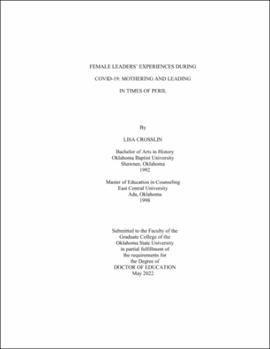| dc.contributor.advisor | Bailey, Lucy E. | |
| dc.contributor.author | Crosslin, Lisa | |
| dc.date.accessioned | 2023-03-31T19:15:01Z | |
| dc.date.available | 2023-03-31T19:15:01Z | |
| dc.date.issued | 2022-05 | |
| dc.identifier.uri | https://hdl.handle.net/11244/337187 | |
| dc.description.abstract | This research began with my tearful reflections as an exasperated mother unsure how to mother and lead in the volatility and fear of a global health crisis. Overwhelmed with the uncertainty of constantly shifting leadership demands, designing new learning systems, and the burden of caring for students and teachers, I spent countless hours planning, collaborating, communicating, acting, and reacting. As intensive leadership consumed my days, I neglected all but the most basic care of my own young children. I toiled in isolation 15 feet away from them, yet unreachable, sequestered behind my home office door. My two daughters were left to fend for themselves in a lonely house, and they suffered. The early abuse and neglect from their biological parents changed their developing brains, so now felt safety is a constant negotiation. Consumed by the fear of failing at work, and failing the teachers, staff, and children for whom I felt responsible, I was completely unaware that I had failed my children during those intense months. I felt forced to choose my job over my girls, a “no choice choice” (Borda, 2021). | |
| dc.description.abstract | As I wrestled with both roles, I wondered how other mother/leaders were managing the cataclysmic changes to their mothering and leading roles. I invited 16 other mother/leaders to share their pandemic accounts, and as their stories encountered mine, our collective navigations coalesced to reveal themes about the cultures of mothering and leading that permeated our lives. Using narratives, images, photographs, collages, written, aural, and sensory data, this study interrogated the social norms of intensive mothering (Hays, 1996) and intensive leadership (Baker, 2016) that mother/leaders encountered, reframed, and resisted during the precarity of COVID-19 (Dolman, 2018). This study created a space where the norms that constrain mother/leaders during crises can be assessed critically with the hopes that they can be dislodged and replaced with more matricentric sensitive policies and practices. | |
| dc.format | application/pdf | |
| dc.language | en_US | |
| dc.rights | Copyright is held by the author who has granted the Oklahoma State University Library the non-exclusive right to share this material in its institutional repository. Contact Digital Library Services at lib-dls@okstate.edu or 405-744-9161 for the permission policy on the use, reproduction or distribution of this material. | |
| dc.title | Female leaders' experiences during COVID-19: Mothering and leading in times of peril | |
| dc.contributor.committeeMember | Curry, Kathy | |
| dc.contributor.committeeMember | Olsen, Jentre | |
| dc.contributor.committeeMember | Kearney, Kerri | |
| osu.filename | Crosslin_okstate_0664D_17697.pdf | |
| osu.accesstype | Open Access | |
| dc.type.genre | Dissertation | |
| dc.type.material | Text | |
| dc.subject.keywords | autoethnography | |
| dc.subject.keywords | COVID | |
| dc.subject.keywords | education leadership | |
| dc.subject.keywords | feminism | |
| dc.subject.keywords | mother | |
| thesis.degree.discipline | School Administration | |
| thesis.degree.grantor | Oklahoma State University | |
